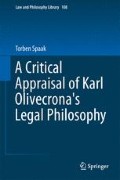Abstract
We have seen that Olivecrona maintains that in addition to its directive and technical functions in legal thinking, the concept of a right can also fulfill an informative function; and we shall see in this chapter that he maintains that legal statements in general can fulfill an informative as well as a directive function, and that in regard to the informative function, these statements can be correct or incorrect, but not true or false. I argue in this chapter (1) that while it is not entirely clear whether Olivecrona in his discussion of truth and correctness is concerned with internal or external legal statements, we should take him to have external legal statements in mind. I also argue (2) that his account of the concept of correctness is self-refuting, and (3) that in any case, a correct, but not true, legal statement cannot fulfill an informative function. But I also argue (4) that Olivecrona does not need the concept of correctness, because he could give a conventionalist account of the truth (or falsity) of legal statements. As I explained in Chap. 7, we may say that a rule is a legal rule if, and only if, it can be traced back to a recognized source of law, SL, such as legislation, precedent, or custom, and that the existence of SL is a matter of convention, in the sense that each member of the community treats SL as a source of law partly because the other members treat SL as a source of law. If we do, we may also say that any given legal statement will be true or false, depending on whether it correctly describes the relevant, conventional legal state of affairs, and this means, of course, that there will be no need to speak of the correctness of legal statements, as distinguished from the truth of such statements.
Access this chapter
Tax calculation will be finalised at checkout
Purchases are for personal use only
Notes
- 1.
I am not, of course, saying that they never make internal legal statements. A recommendation to courts and others that they choose one interpretation of a statute over another is clearly an internal legal statement.
- 2.
I would like to thank Jan Österberg for drawing my attention to this argument on Olivecrona’s part.
- 3.
As Brian Bix has pointed out in email correspondence, one might try to save Olivecrona by speaking of ‘physical control’ and ‘abandonment’ instead of ‘acquisition’ and ‘disposal.’ But it seems to me that if one did, one would also have to explain how to analyze the concept of ownership in such non-legal, empirical terms; and given his claim (in the second quotation in Sect. 13.2) that it is “no empirical fact that I own a certain house” and his objections to the attempts by Justice Holmes and others to analyze legal concepts in empirical terms (see Sect. 5.3), Olivecrona would hardly want to make such an attempt himself.
- 4.
Olivecrona does not say ‘adequate,’ but ‘correct.’ But speaking of ‘correctness’ here will not do, since it leads to a vicious circle. What he needs is a more general term, such as ‘adequacy,’ which can cover both truth and correctness in Olivecrona’s sense.
- 5.
I argued in Sect. 13.2 that the need for committed evaluations also disappears if one adopts the internal point of view in a detached way.
References
Articles
MacCormick, Neil. 1986. Law, morality and positivism. In An institutional theory of law, ed. Neil MacCormick and Ota Weinberger, 127–144. Dordrecht: Reidel.
Books
Hart, H. L. A. 1961. The concept of law. Oxford: Clarendon Press.
Olivecrona, Karl. 1971. Law as fact. 2nd ed. London: Stevens & Sons.
Raz, Joseph. 1990. Practical reason and norms. 2nd ed. Princeton: Princeton University Press.
Author information
Authors and Affiliations
Corresponding author
Rights and permissions
Copyright information
© 2014 Springer International Publishing Switzerland
About this chapter
Cite this chapter
Spaak, T. (2014). Truth and Correctness. In: A Critical Appraisal of Karl Olivecrona's Legal Philosophy. Law and Philosophy Library, vol 108. Springer, Cham. https://doi.org/10.1007/978-3-319-06167-2_13
Download citation
DOI: https://doi.org/10.1007/978-3-319-06167-2_13
Published:
Publisher Name: Springer, Cham
Print ISBN: 978-3-319-06166-5
Online ISBN: 978-3-319-06167-2
eBook Packages: Humanities, Social Sciences and LawLaw and Criminology (R0)

